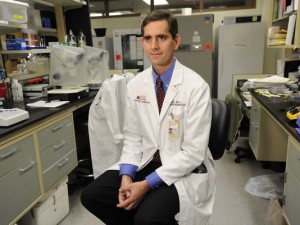Clinical
CLINICAL: Infectious Diseases
The division’s 19 faculty members provide care and clinical expertise in infectious diseases at UVA Hospital’s inpatient medical wards, through a busy consult service, and at six outpatient clinics. They manage virtually all infectious diseases cases in the hospital, with specific areas of expertise in:
- antibiotic resistance (Mathers)
- diarrheal diseases (Petri)
- fungal infections (Donowitz, Scheld)
- HIV medicine (Moore, Scheld, Townsend, Wispelwey)
- infections in cancer patients (Donowitz, Sifri, Wispelwey)
- meningitis and brain abscess (Scheld, Wispelwey)
- nosocomial (healthcare-associated) infections and hospital epidemiology (Sifri)
- pneumonia (Donowitz, Houpt)
- sexually transmitted diseases (Eby, Warren)
- tick-borne diseases (Petri, Scheld)
- transplant-related infectious diseases (Donowitz, Sifri, Wispelwey)
- tropical medicine (Hewlett, Houpt, Hughes, Pearson, Petri)
- tuberculosis (Heysell, Houpt, Thomas)
The division faculty provides substantial inpatient care on the general medicine wards; in FY13, about one-third of attending staffing was supplied by ID physicians, who exceeded the 90th percentile in UHC measures of productivity. They also provide consultations in infectious diseases and transplant infectious diseases at UVA Hospital and Culpepper Hospital– more than 7,000 in FY13 – and lead or co-lead the Infection Control, Formulary, and Antibiotic Utilization committees.
Highlight: Smartphones Become Weapon Against HIV
 One of the division’s essential roles is providing oversight of the medical center’s infection control program and efforts related to quality improvement in the prevention and control of healthcare-associated infections. Targeted projects by hospital epidemiologist Costi Sifri and fellow ID faculty members Amy Mathers and Heather Cox have led to reduced rates of pseuodomonal antibacterial resistance in intensive care units, and of Clostridium difficile infection in general medicine wards. Mathers and Cox lead the medical center-wide Antibiotic Stewardship Program, initiated in 2009 to address the dual problems of increased antimicrobial resistance and declining new antimicrobials.
One of the division’s essential roles is providing oversight of the medical center’s infection control program and efforts related to quality improvement in the prevention and control of healthcare-associated infections. Targeted projects by hospital epidemiologist Costi Sifri and fellow ID faculty members Amy Mathers and Heather Cox have led to reduced rates of pseuodomonal antibacterial resistance in intensive care units, and of Clostridium difficile infection in general medicine wards. Mathers and Cox lead the medical center-wide Antibiotic Stewardship Program, initiated in 2009 to address the dual problems of increased antimicrobial resistance and declining new antimicrobials.  The program’s efforts to reduce antibiotic use have resulted in savings of approximately one million dollars a year in the last two years. The division’s quality officer, Joshua Eby, has focused on improved management of pneumonia in the past year – one of the Medical Center’s key QI goals – and on updating its pneumonia management guidelines. ID is working on refining metrics for patient care provided by its physicians in the outpatient and inpatient settings, and has proposed using Epic to measure consult responsiveness and efficacy.
The program’s efforts to reduce antibiotic use have resulted in savings of approximately one million dollars a year in the last two years. The division’s quality officer, Joshua Eby, has focused on improved management of pneumonia in the past year – one of the Medical Center’s key QI goals – and on updating its pneumonia management guidelines. ID is working on refining metrics for patient care provided by its physicians in the outpatient and inpatient settings, and has proposed using Epic to measure consult responsiveness and efficacy.
Highlight: Clinic Directors and Stats
The division’s six outpatient clinics include the Infectious Diseases Clinic (HIV and general infectious diseases), the Sexually Transmitted Diseases Clinic, HCV Clinic, Musculoskeletal Clinic and the Travelers’ Clinic. The Transplant Infectious Diseases program provides both inpatient and outpatient consultation in infectious disease management and prevention for transplant recipients and donors, who take immunosuppressing drugs that make them vulnerable to opportunistic infections. ID physicians maintain patient satisfaction survey scores above 92% for outpatient settings.
The division launched two new clinics in the last year to address important needs: one for orthopedic surgery patients, who are at high risk for post-surgical infections, led by Christopher Moore; and another for hepatitis C patients, with a particular focus on patients co-infected with HCV and HIV, led by Rebecca Dillingham. The orthopedic infections clinic has resulted in improved management of this patient population.
Highlight: Ryan White HIV/AIDS Clinic Expands Services
The Ryan White clinic, directed by Greg Townsend, cares for 800 individuals with HIV/AIDS, as well as patients with other infectious diseases. Research conducted at the clinic includes participation in antiretroviral protocols, new approaches to improve adherence to therapy, and evaluation of therapies for opportunistic infections. The clinic is also at the forefront of compiling quality metrics for HIV care. In the future the division hopes to find larger physical space for the clinic, in order to support expanded services and staff.
